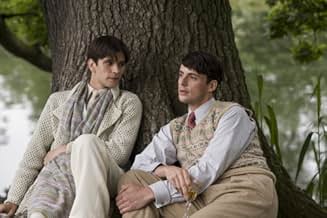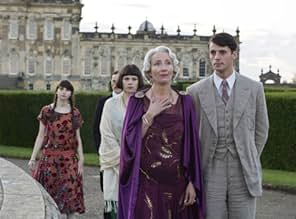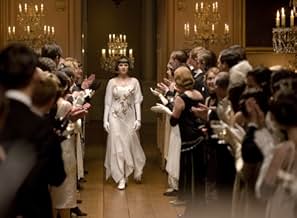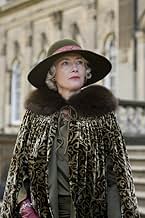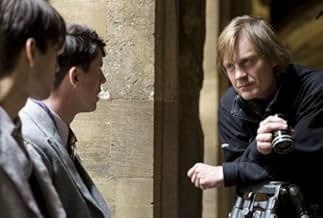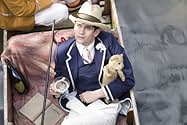IMDb रेटिंग
6.6/10
14 हज़ार
आपकी रेटिंग
द्वितीय विश्व युद्ध से पहले के इंग्लैंड में निषिद्ध प्रेम और असमय परिपक्वता की एक मार्मिक कहानी.द्वितीय विश्व युद्ध से पहले के इंग्लैंड में निषिद्ध प्रेम और असमय परिपक्वता की एक मार्मिक कहानी.द्वितीय विश्व युद्ध से पहले के इंग्लैंड में निषिद्ध प्रेम और असमय परिपक्वता की एक मार्मिक कहानी.
- निर्देशक
- लेखक
- स्टार
- पुरस्कार
- 11 कुल नामांकन
फ़ीचर्ड समीक्षाएं
It's attributed to just about everybody - from Ginger Rogers to Milan Kundera - and it sounds so right: "There are no small parts, only small actors."
If you want proof and a real understanding of the adage, revisit "Brideshead Revisited," and behold the miracle of Emma Thompson's Lady Marchmain, sucking the life out of anything and anybody she touches, and Michael Gambon's delightfully dissolute Lord Marchmain. She has about 10 minutes on the screen, he perhaps four, and yet their characters will follow you out of the theater, and stay with you at length.
Thompson's work is especially dazzling because the mean, sanctimonious character is so clearly alien to the actress (in fact, I suspected miscasting when I first heard of her assignment) and also as the character is so exaggerated, almost a caricature. And yet, Thompson gives the challenge her all, and walks away with it; the performance has Best Supporting Actress written all over it.
It's difficult to believe that the man you see as Marchmain is the same actor who was the "Singing Detective" (of the superb BBC series, not the Robert Downey Jr. mishap). Gambon has a range as wide as all outdoors, and you never ever see effort in the performance. His amiable Marchmain - subtly hinting at a complex character under the surface - has a physical similarity to Gambon's Uncle Vanya on the London stage, but otherwise, it's a unique creation.
What else is there to this new "edition" of "Brideshead"? A great deal, but only if you're among those who missed both Evelyn Waugh's novel and the wonderful Granada TV realization 27 long years ago - Irons! Gielgud! Olivier! - how can you compete with that? So, if it's a first-time visit, see the movie by all means; if you can recite lines from the book or the TV series, you can survive without the new version.
In 135 minutes, the film is handling well what the TV series did so completely in - yes - 13 HOURS. Obviously, except for the basic story line (script by Jeremy Brock, of "The Last King of Scotland"), this is a different kind of animal, still "leisurely" enough, but unable to luxuriate in the smallest details as the series did. The director is Julian Jarrold, and he is doing far better than in his recent "Becoming Jane," keeps the story moving in a smooth fashion.
As to the leading roles in the film, they are all well acted, but without great impact. Matthew Goode is Charles Ryder, the focal character; Ben Whishaw is the slightly over-flamboyant Sebastian Flyte (who needs understating more than exaggerating - Anthony Andrews' performance in the TV series was exactly right); Hayley Atwell is Sebastian's sister (and rival for Charles' affection).
One amazing thing about "Brideshead" is how this story from a different time, about characters from a different world, remains interesting and meaningful. It's almost as if Waugh's work was bulletproof - not that these filmmakers were less than respectful to the author. A better test would be a Eurotrash opera version, heaven forfend.
If you want proof and a real understanding of the adage, revisit "Brideshead Revisited," and behold the miracle of Emma Thompson's Lady Marchmain, sucking the life out of anything and anybody she touches, and Michael Gambon's delightfully dissolute Lord Marchmain. She has about 10 minutes on the screen, he perhaps four, and yet their characters will follow you out of the theater, and stay with you at length.
Thompson's work is especially dazzling because the mean, sanctimonious character is so clearly alien to the actress (in fact, I suspected miscasting when I first heard of her assignment) and also as the character is so exaggerated, almost a caricature. And yet, Thompson gives the challenge her all, and walks away with it; the performance has Best Supporting Actress written all over it.
It's difficult to believe that the man you see as Marchmain is the same actor who was the "Singing Detective" (of the superb BBC series, not the Robert Downey Jr. mishap). Gambon has a range as wide as all outdoors, and you never ever see effort in the performance. His amiable Marchmain - subtly hinting at a complex character under the surface - has a physical similarity to Gambon's Uncle Vanya on the London stage, but otherwise, it's a unique creation.
What else is there to this new "edition" of "Brideshead"? A great deal, but only if you're among those who missed both Evelyn Waugh's novel and the wonderful Granada TV realization 27 long years ago - Irons! Gielgud! Olivier! - how can you compete with that? So, if it's a first-time visit, see the movie by all means; if you can recite lines from the book or the TV series, you can survive without the new version.
In 135 minutes, the film is handling well what the TV series did so completely in - yes - 13 HOURS. Obviously, except for the basic story line (script by Jeremy Brock, of "The Last King of Scotland"), this is a different kind of animal, still "leisurely" enough, but unable to luxuriate in the smallest details as the series did. The director is Julian Jarrold, and he is doing far better than in his recent "Becoming Jane," keeps the story moving in a smooth fashion.
As to the leading roles in the film, they are all well acted, but without great impact. Matthew Goode is Charles Ryder, the focal character; Ben Whishaw is the slightly over-flamboyant Sebastian Flyte (who needs understating more than exaggerating - Anthony Andrews' performance in the TV series was exactly right); Hayley Atwell is Sebastian's sister (and rival for Charles' affection).
One amazing thing about "Brideshead" is how this story from a different time, about characters from a different world, remains interesting and meaningful. It's almost as if Waugh's work was bulletproof - not that these filmmakers were less than respectful to the author. A better test would be a Eurotrash opera version, heaven forfend.
The Granada people got it right in 1979 when they set out to film "Brideshead Revisited." They realized that Evelyn Waugh's great novel could not be done justice in a single film of two or even three hours. It had to be made into an extended mini-series. Thus, the great 11-part TV series of 1981 - the first and only great film version of Waugh's novel.
Yet, in 2008, BBC Films thought it was time for a remake. The result is this film adaptation. It lasts just over two hours. It skims over or skips characters. It changes the focus, and thus the story. It misses the essence of Waugh's story completely. So, it's more proper to call this a major revision - a revised story based on Waugh's novel.
Even Emma Thompson as Lady Marchmain and Michael Gambon as Lord Marchmain can't lift this revised story to an acceptable imitation. Apparently, because the story is so profound, BBC films chose to promote this as a remake of the TV series from Waugh' great novel. That being the case, one is led naturally to comparison. Thus, this film fails.
Still, for some fair acting by the cast, I give it five stars as though it were a different story entirely. After all, the cast can't be held accountable for the plot. Although Thompson's almost muted performance hints that she may realize she's in a far inferior work that has borrowed a great title.
Yet, in 2008, BBC Films thought it was time for a remake. The result is this film adaptation. It lasts just over two hours. It skims over or skips characters. It changes the focus, and thus the story. It misses the essence of Waugh's story completely. So, it's more proper to call this a major revision - a revised story based on Waugh's novel.
Even Emma Thompson as Lady Marchmain and Michael Gambon as Lord Marchmain can't lift this revised story to an acceptable imitation. Apparently, because the story is so profound, BBC films chose to promote this as a remake of the TV series from Waugh' great novel. That being the case, one is led naturally to comparison. Thus, this film fails.
Still, for some fair acting by the cast, I give it five stars as though it were a different story entirely. After all, the cast can't be held accountable for the plot. Although Thompson's almost muted performance hints that she may realize she's in a far inferior work that has borrowed a great title.
No love story can be altogether gratifying in which the central choices are decided by the mother of the woman in love, even less, when she is the mother of both lovers, and has faith that she is protecting their everlasting spirits. That is what seems to be the predicament in Evelyn Waugh's novel, now adapted into a stagnant film in which one is not invited to feel or react due to its own lack of feeling or solidly portrayed consequence.
This film version focuses on forbidden love and the death of purity, set before WWII. Matthew Goode, who was excellent as the villain in The Lookout, becomes spellbound with a noble family, first because of his friendship with a charming, provocative, apparently homosexual contemporary, and then his sister. The fluctuation of Goode's obsessions suggest the decay of a self-indulgent upper crust in England flanked by the two World Wars, related in the course of his recurring stays at the Brideshead estate. What's more fundamental to Waugh's story is the harsh Catholicism of the family, as imposed by their matriarch, played by Emma Thompson, the high point of the film by far. Their religious beliefs are confronted by the son's homosexuality, the daughter's adulterous liaison with Goode, and Goode's atheism.
There are two curious fathers in the film. Michael Gambon is one, still legitimately married sure enough, but is ostracized, living in a Venetian palazzo with his mistress, Greta Scacchi in an unexpected comeback. Goode's father is a definite oddball who lives enclosed in a London house and seemingly favors playing chess with himself to talking to his son.
The main character is a penniless, virtually parentless youth drifting through an alien social system. Goode plays him featurelessly really, a nondescript motor for the other characters. Ben Whishaw steals all of his scenes as the gay son. The daughter could definitely have been portrayed more warily. The actress, Hayley Atwell makes the most of her I suppose, but why would she marry the revolting and unbearable suitor instead of Goode?
I am sure that the reason this film is not very effective at all is because so much background and source material is condensed and maybe sacrificed into such a shorter running time. But why are so many other adaptations effective in spite of this factor?
This film version focuses on forbidden love and the death of purity, set before WWII. Matthew Goode, who was excellent as the villain in The Lookout, becomes spellbound with a noble family, first because of his friendship with a charming, provocative, apparently homosexual contemporary, and then his sister. The fluctuation of Goode's obsessions suggest the decay of a self-indulgent upper crust in England flanked by the two World Wars, related in the course of his recurring stays at the Brideshead estate. What's more fundamental to Waugh's story is the harsh Catholicism of the family, as imposed by their matriarch, played by Emma Thompson, the high point of the film by far. Their religious beliefs are confronted by the son's homosexuality, the daughter's adulterous liaison with Goode, and Goode's atheism.
There are two curious fathers in the film. Michael Gambon is one, still legitimately married sure enough, but is ostracized, living in a Venetian palazzo with his mistress, Greta Scacchi in an unexpected comeback. Goode's father is a definite oddball who lives enclosed in a London house and seemingly favors playing chess with himself to talking to his son.
The main character is a penniless, virtually parentless youth drifting through an alien social system. Goode plays him featurelessly really, a nondescript motor for the other characters. Ben Whishaw steals all of his scenes as the gay son. The daughter could definitely have been portrayed more warily. The actress, Hayley Atwell makes the most of her I suppose, but why would she marry the revolting and unbearable suitor instead of Goode?
I am sure that the reason this film is not very effective at all is because so much background and source material is condensed and maybe sacrificed into such a shorter running time. But why are so many other adaptations effective in spite of this factor?
The greatness of the original Brideshead Revisited was in the luxury of being able to transpose a very complicated emotional and intellectual book into words. It succeeded in this, but only just, due to superb direction, photography and script which, even in its sparseness, only just allowed the successful transition to film. The problem with anything shorter is that, if it took Mortimer so many episodes to get it right, then there are very few writers who could even get near in under 4 hours, if that. So lets stop beating about the bush. This is a sound reproduction of the calender plot but after that it is not Brideshead Revisited. Call it by another name and I will laud it. It brings in a strong homosexual element and a early sexual attraction between Charles Ryder and Miss Flyte. With that everything becomes unbalanced. Motivations change. The beauty of the original is that it hinted at ????something (a je ne sais quoi) and it was that and the ever strengthening Catholic awareness of family that made this film so fascinating. The original's masterpiece was the script supported by the cine photography. That has been lost. But taken as is, a pretty and interesting film which seems to be loosely based on an early fifties work by Waugh.
I haven't read Evelyn Waugh's famous 1945 novel or seen Granada's acclaimed 1981 television adaptation. so I approached the story fresh, as indeed will most viewers of this quintessentially England tale of the repressive nature of religion and class. I understand that the adaptation by Andrew Davies and Jeremy Brock has taken some liberties with the original, more subtle narrative, but this is inevitable in a work of just 133 minutes compared to the 11 episodes of the television series.
Directed by the English Julian Jarrold who made "Becoming Jane", the film has many strengths. There are wonderful locations in Oxford, Venice, Morocco and above all Castle Howard in North Yorkshire standing in - as in the television version - as the eponymous country house that is almost a character in itself. The script contains some fine lines - often very cutting and very cruel. Above all, there is some accomplished acting, both from veterans Michael Gambon and Emma Thompson as Lord and Lady Marchmain and newcomers Ben Whishaw and Hayley Attwell as their son Sebastian and daughter Julia and Matthew Goode as Charles Ryder, a young artist who falls in love in different ways with both Sebastian and Julia as well as their home and style.
Sadly, however, ultimately the whole film seems somewhat pedestrian and leaves one feeling strangely cold and disconnected.
Directed by the English Julian Jarrold who made "Becoming Jane", the film has many strengths. There are wonderful locations in Oxford, Venice, Morocco and above all Castle Howard in North Yorkshire standing in - as in the television version - as the eponymous country house that is almost a character in itself. The script contains some fine lines - often very cutting and very cruel. Above all, there is some accomplished acting, both from veterans Michael Gambon and Emma Thompson as Lord and Lady Marchmain and newcomers Ben Whishaw and Hayley Attwell as their son Sebastian and daughter Julia and Matthew Goode as Charles Ryder, a young artist who falls in love in different ways with both Sebastian and Julia as well as their home and style.
Sadly, however, ultimately the whole film seems somewhat pedestrian and leaves one feeling strangely cold and disconnected.
क्या आपको पता है
- ट्रिवियाDame Emma Thompson threatened to quit this movie if the producers persisted in pushing actress Hayley Atwell to lose weight. Atwell said that Harvey Weinstein even insulted her over lunch by saying: "You look like a fat pig on-screen. Stop eating so much."
- गूफ़After the dinner, at which Charles first meets Lady Marchmain, the family go to pray in the private chapel. The ladies, as Roman Catholics, would have covered their heads with a scarf or a veil.
- भाव
Sebastian Flyte: I asked too much of you. I knew it all along, really. Only God can give you that sort of love.
टॉप पसंद
रेटिंग देने के लिए साइन-इन करें और वैयक्तिकृत सुझावों के लिए वॉचलिस्ट करें
- How long is Brideshead Revisited?Alexa द्वारा संचालित
विवरण
- रिलीज़ की तारीख़
- कंट्री ऑफ़ ओरिजिन
- आधिकारिक साइट
- भाषाएं
- इस रूप में भी जाना जाता है
- Hôn Nhân Thượng Lưu
- फ़िल्माने की जगहें
- उत्पादन कंपनियां
- IMDbPro पर और कंपनी क्रेडिट देखें
बॉक्स ऑफ़िस
- बजट
- $2,00,00,000(अनुमानित)
- US और कनाडा में सकल
- $64,32,256
- US और कनाडा में पहले सप्ताह में कुल कमाई
- $3,39,616
- 27 जुल॰ 2008
- दुनिया भर में सकल
- $1,34,51,186
- चलने की अवधि2 घंटे 14 मिनट
- रंग
- ध्वनि मिश्रण
- पक्ष अनुपात
- 2.35 : 1
इस पेज में योगदान दें
किसी बदलाव का सुझाव दें या अनुपलब्ध कॉन्टेंट जोड़ें



